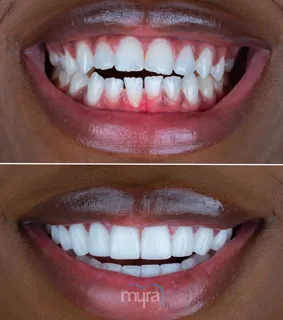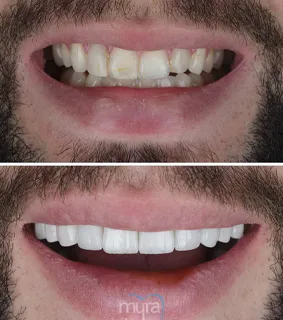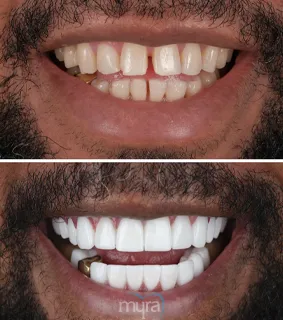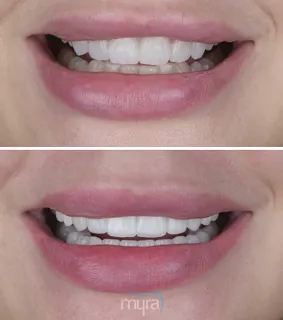Dentures are removable dental prostheses used to replace lost teeth and surrounding tissues. Dentures are often made of acrylic resin or a mix of metal and acrylic materials and are manufactured specifically to fit the wearer's mouth. People who have lost their natural teeth considerably improve their appearance, usefulness, and oral health with dentures.
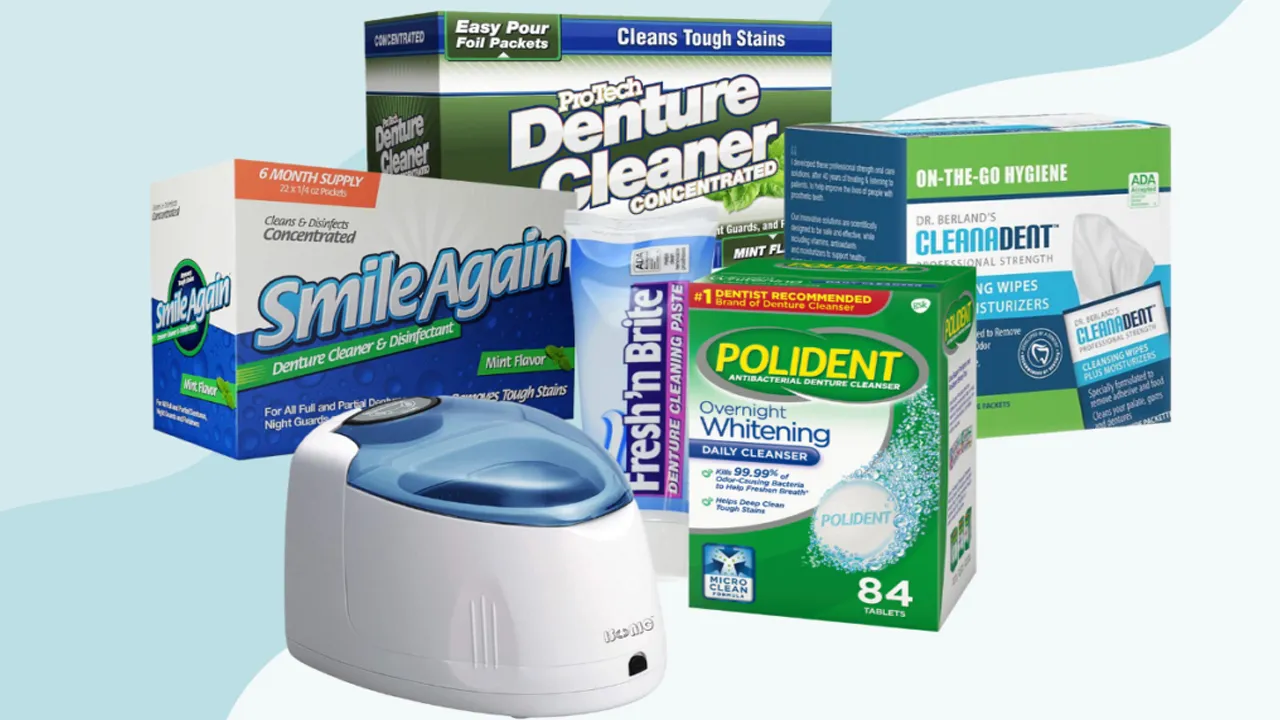
Listed below are the seven ways how to clean dentures.
- Take your dentures out of your mouth.Remove the dentures from the mouth to begin the cleaning process. Handle the dentures with care to prevent them from dropping or harming them.
- Use a toothbrush with gentle bristles.Choose a toothbrush with gentle bristles that are specially made for cleaning dentures. Regular toothpaste must not be used because it scratches the surface of one's dentures.
- Brush your dentures lightly to remove bacteria and loosen them.Brush the dentures' teeth, gums, and any clasps or attachments with gentle circular motions. It helps in removing bacteria, food residue, and plaque accumulation.
- Clean the denture surface thoroughly.Thoroughly clean the denture surface. Pay close attention to the front, back, and chewing surfaces of the dentures. Make sure to remove any dirt or stains thoroughly yet gently.
- Soak dentures overnight in lukewarm water or a denture-soaking solution.It is advisable to soak one's dentures overnight after brushing. Use lukewarm water or a denture-soaking solution created especially for dentures. Observe the directions on the product's container or the ones provided by the dentist.
- Rinse your dentures before wearing them.Rinse the dentures in one's mouth thoroughly before putting them back in to remove any leftover soaking solution residue. The dentures are more sanitary and devoid of any harmful substances after that step.
- Never put dentures in hot water to soak.Dentures must not be soaked in hot water since it increases the risk of warping or shape loss. Follow the instructions and use lukewarm water or denture-soaking solutions.
1. Take Your Dentures Out Of Your Mouth.
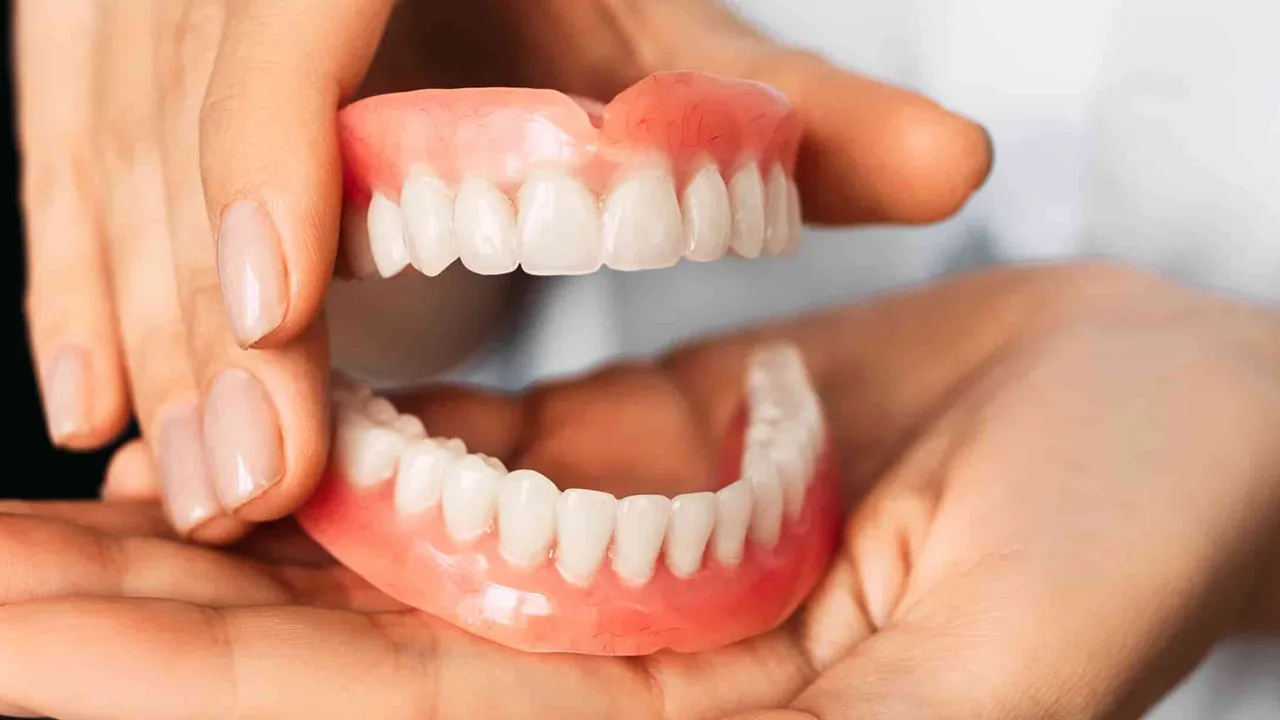
Taking dentures out of one's mouth is an important step in the denture-cleaning process. The procedure is done by delicately removing one's dentures from their mouth so that they are completely cleaned and maintained. There are a few obstacles to consider, despite the apparent simplicity.
One obstacle is the risk of dropping or harming the dentures during removal. Incorrect handling of dentures causes them to break. Dentures must be handled carefully, with a firm grasp, and without making any rapid movements that send them tumbling.
The advantages of removing dentures for cleaning are substantial. Removing the dentures makes it easier to clean the dentures' entire surface area. One uses a toothbrush or other cleaning tools to reach areas by removing them that are difficult to clean while wearing the dentures. Better dental hygiene is encouraged due to the more efficient removal of microorganisms, food fragments, and plaque.
Taking the dentures out of the mouth is not generally more complex than other cleaning procedures, though getting dentures out requires some delicacy and caution. Taking dentures out for cleaning is regarded as one of the best procedures due to its thoroughness and ability to inspect the dentures closely. The technique makes it easier to brush, soak, and rinse dentures more effectively, leading to cleaner, more sanitary dentures. The opportunity to carefully examine the dentures contributes to maintaining their integrity and resolving problems as soon as they arise.
2. Use A Toothbrush With Gentle Bristles.
Using a toothbrush with gentle bristles is a significant step in cleaning dentures. Choosing a toothbrush with soft or gentle bristles that are specifically made for cleaning dentures is the first step in the procedure. There are a few challenges and important advantages to consider.
One obstacle to using a toothbrush with gentle bristles is ensuring that one has the correct type of toothbrush for denture cleaning. It's essential to use a toothbrush made especially for cleaning dentures to prevent using a standard toothbrush with abrasive bristles that end up harming the denture surface.
The advantages of using a toothbrush with soft bristles are numerous. The first benefit of mild bristles is that they do not scratch or abrade the denture's surface, which harbours bacteria and results in discolouration or odours. The delicate bristles' efficient removal of microorganisms, food particles, and plaque does not harm dentures.
Cleaning dentures using a toothbrush with soft bristles is sometimes more difficult. Cleaning dentures is a simple and efficient method, although physical brushing and close attention are required. The secret is ensuring that all denture surfaces are sufficiently cleaned by applying light pressure and brushing strokes.
One of the reasons why using a toothbrush with soft bristles is said to be among the best techniques is that it enables exact cleaning of the dentures. The soft bristles remove debris and microorganisms by reaching into tight spaces and difficult-to-reach places. The risk of wear and tear is further decreased by the gentle brushing movement, which helps to maintain the integrity of the denture components.
3. Brush Your Dentures Lightly To Remove Bacteria And Loosen Them.
Brushing one's dentures gently to remove and loosen bacteria entails cleaning the denture surfaces with a gentle brushing motion. One obstacle in brushing dentures is ensuring that one utilises the proper technique and pressure. Abrasions or scratches to the denture material result from brushing too vigorously or with a forceful hand. It is essential to brush with a soft touch and gentle, circular motions to properly remove bacteria and debris without damaging the integrity of the dentures.
The benefits of lightly brushing dentures are significant. Brushing helps in removing plaque build-up, bacteria, and food debris that develop on the denture surfaces during the day. Brushing provides mechanical cleansing action that dislodges and eliminates the particles, enhancing oral hygiene and lowering the risk of bad breath and gum discomfort.
Lightly brushing dentures is not necessarily more difficult than other cleaning techniques. Manual brushing and close attention are needed, but it becomes a regular aspect of caring for dentures with the right technique and repetition.
Brushing dentures lightly is one of the most excellent methods since it allows for targeted cleaning. One thoroughly cleans the teeth, gums, and any attachments or clasps on the dentures by using a toothbrush with soft bristles and a light touch. The technique provides thorough cleaning, promoting the longevity and hygienic care of the dentures.
4. Clean The Denture Surface Thoroughly.
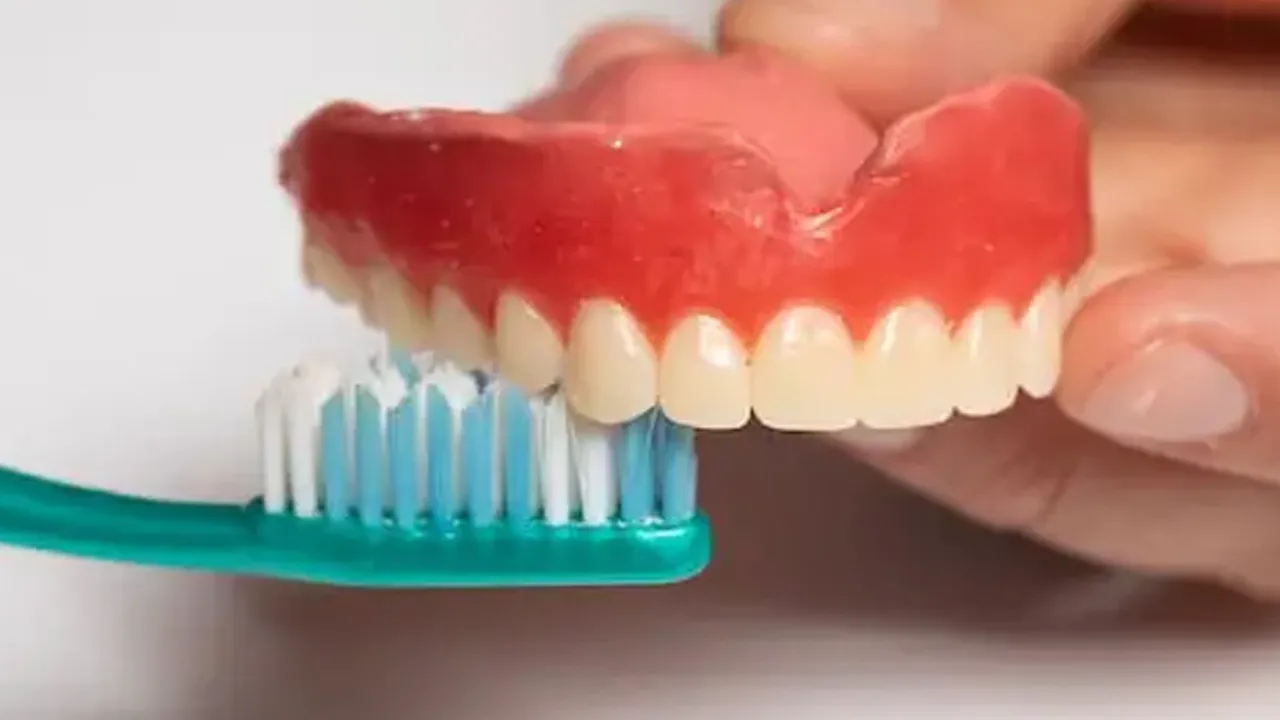
Cleaning the denture surface requires attention to detail to ensure that all areas of the dentures are cleansed. Regular inspection is made attainable by adequately cleaning the denture surface. One sees any indications of wear, damage, or fit difficulties that require expert treatment by carefully inspecting the dentures while they are being cleaned. The durability and usefulness of the dentures are improved with routine inspection.
The presence of difficult-to-reach places or intricate designs on the dentures is an obstacle to full cleaning of the denture surface. Dentures contain nooks, clasps, or attachments where debris and bacteria collect, making thorough cleaning difficult. It is necessary to utilise extra instruments, such as denture cleaners or interdental brushes, to adequately brush the areas.
The benefits of adequately cleaning the denture surface are substantial. The first benefit of thorough cleaning is the removal of any food particles, bacteria, and plaque that have gotten stuck on the dentures. Infections of the mouth, poor breath, and gum inflammation are decreased as a result. Cleaning the denture helps to keep the oral cavity and dentures clean. Cleaning the denture surface helps to remove any stains or discolouration that have occurred over time. It makes the dentures look better and encourages a happier, more genuine grin.
Cleaning the denture surface takes more time and effort than other procedures. Each component of the dentures must be thoroughly examined and cleaned, ensuring every space is addressed. Using additional equipment or cleaning methods to adequately access and clean difficult-to-reach places are necessary depending on how complex the denture design is.
Cleaning the denture surface is considered one of the best approaches because it ensures optimal cleanliness and hygiene. One reduces their risk of oral health problems, including infections or inflammation, by paying strict attention to detail and thoroughly cleaning all denture surfaces. The dentures' visual attractiveness is maintained to help them look at their finest.
5. Soak Dentures Overnight In Lukewarm Water Or A Denture-Soaking Solution.
Soaking dentures overnight in lukewarm water or a denture-soaking solution entails immersing the dentures in a liquid to enhance cleansing, disinfection, and upkeep. The overnight soaking of dentures is a practical technique. The dentures are cleaned and disinfected continuously if done at night when they are not being used.
Finding an excellent denture-soaking solution is one issue with soaking teeth overnight. Several commercially available soaking solutions or denture cleansers are made especially for caring for dentures. It's essential to select a solution compatible with the components of one's dentures and adhere to the directions given by the product maker or dentist.
The main benefit of soaking dentures overnight is to give the cleaning agent more time to operate, effectively dissolving and releasing debris or plaque. Dentures are sanitised by soaking them overnight. The soaking solution with antibacterial qualities helps eliminate bacteria, fungi, and other germs on the dentures.
Soaking dentures overnight is relatively easy compared to other methods. Soaking the dentures needs far less work than manual brushing or cleaning procedures. The process allows the cleaning solution to do its magic after the dentures are submerged in the cleaning solution.
Soaking dentures overnight is one of the best treatments because it enables thorough cleaning and disinfection. The prolonged soaking time provides a more thorough removal of debris and microorganisms compared to quicker cleaning techniques. Use the denture-cleaning solution to preserve the integrity of the denture materials.
6. Rinse Your Dentures Before Wearing Them.
Rinsing the dentures before wearing them means washing them with water or a denture-cleaning solution before placing them back in the mouth. Rinsing is simple and efficient for dentures before wearing them. It is convenient for everyday use because it is finished in seconds. It is beneficial when one needs more time for a comprehensive cleaning or soaking procedure but wants to ensure everything feels clean and fresh.
The advantages of cleaning one's dentures before wearing them are significant. The first benefit of rinsing is that it aids in getting rid of any dirt or cleaning agent residue that is left on the denture surfaces. Rinsing makes sure that the dentures are clean and devoid of any chemicals or other substances that irritate the mouth or have other harmful effects.
Rinsing the dentures before wearing them is a straightforward and easy task in terms of complexity. Rinsing does not require any additional equipment or complicated techniques. It is simple to include into one's everyday routine before re-inserting their dentures.
Rinsing the dentures is one of the greatest techniques since it offers a last stage in the cleaning procedure, which is one of the reasons it is regarded as one of the best practices. Rinsing makes sure that there are no cleaning chemicals or other materials on the dentures that irritate the mouth or harm oral health. One preserves the cleanliness and comfort of their dentures by taking the extra step of rinsing.
7. Never Put Dentures In Hot Water To Soak.
Never putting dentures in hot water to soak is a great practice that helps the dentures last longer. One ensures that their dentures stay strong and functional for a longer time by avoiding heat-related damage. They do not need to make as many repairs or replacements to save time, money, and effort.
The main issue is the danger of heat damage to the dentures. Dentures stretch, deform, or lose their shape in hot water. It leads to an uncomfortable fit, problems wearing the dentures, and other issues.
The advantages of never putting dentures in hot water are essential for preserving the quality and durability of the dentures. Never putting dentures in hot water to soak helps maintain the dentures' form and shape. Any shape changes to dentures cause discomfort and reduced functionality because they are manufactured specifically to fit the contours of one's mouth.
Never putting dentures in hot water is a simple and easy practice. It merely involves awareness and the substitution of cool or lukewarm water. The technique doesn't require extra steps or difficult processes compared to other cleaning techniques.
What Is Denture?
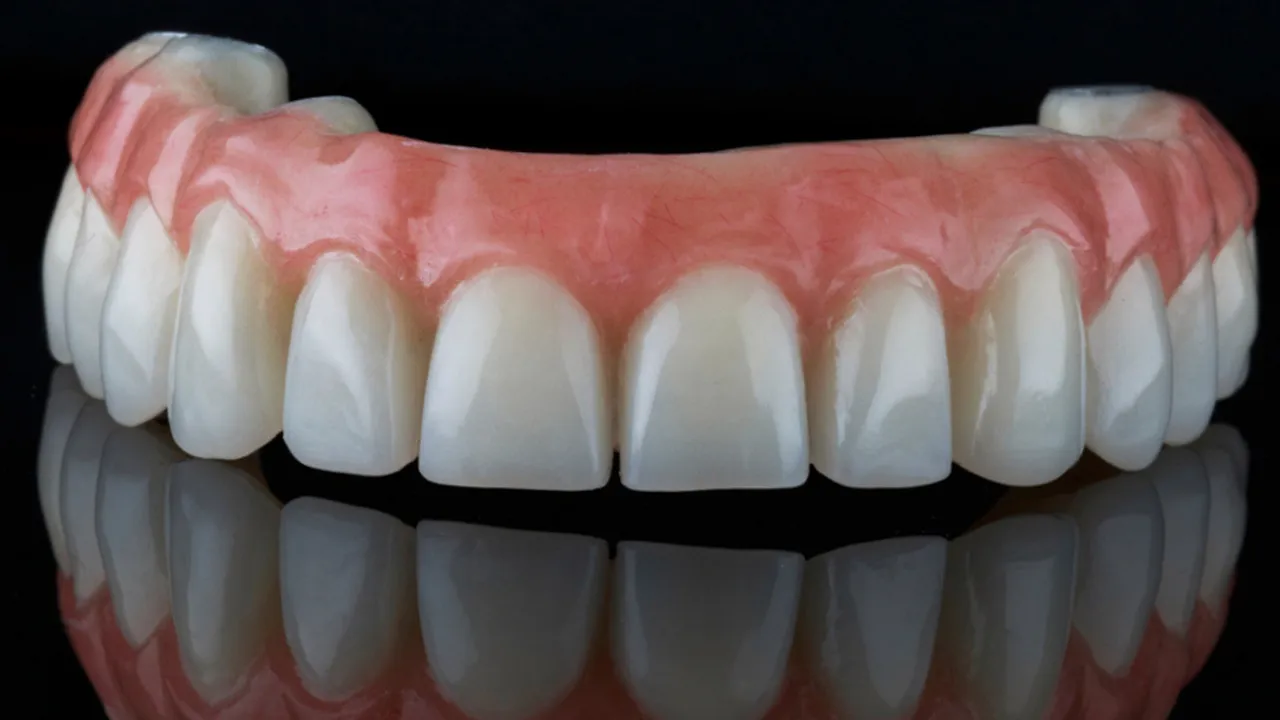
Dentures are removable dental prostheses used to replace missing teeth and surrounding tissues in the mouth. Dentures are used to replace just a few missing teeth, called partial dentures or a whole arch of teeth, called complete dentures, and they are manufactured specifically to fit the wearer's mouth. Acrylic resin, or a mixture of acrylic and metal elements, makes up most dentures. They enable people to chew, speak, and smile with confidence since they are designed to resemble the appearance and functionality of genuine teeth.
The primary purpose of dentures is to re-establish the oral functionality lost when natural teeth are gone. Dentures allow people to chew and bite food effectively, enhancing their capacity to consume a varied and nutrient-rich diet. Dentures are accomplished by replacing missing teeth. They prevent the sunken appearance that results from tooth loss by supporting the lips and cheeks and preserving the structure of the face.
People who wear dentures benefit in several ways. Dentures greatly enhance smiling attractiveness, improving self-esteem and confidence. Dentures offer a natural-looking and aesthetically pleasing smile since they are manufactured to match the gums' and teeth' natural shape and colour. Speaking is improved with dentures for someone who lacks teeth. A denture helps in correctly articulating words and sounds, correcting any speech problems resulting from tooth loss.
What Are The Best Practices For Cleaning Dentures?
Listed below are the best practices for cleaning dentures.
- Remove and rinse:Remove the dentures and wash them in running water to remove any leftover food or dirt.
- Utilise a soft-bristle brush:One either uses a soft-bristle toothbrush or a denture brush that is specially made for cleaning dentures. Regular toothbrushes must not be used because of how damaging their harsh bristles are to denture surfaces.
- Brush thoroughly:Gently brush all denture surfaces, including teeth, gums, and any attachments or clasps. Pay close attention to any locations where there are stains or accumulation. Make sure to clean gently and thoroughly without using too much pressure.
- Use gentle cleaning agents:Use a gentle denture paste, gentle liquid dish soap, or gentle denture cleaner to clean the dentures. Bleach, toothpaste, and household cleaners must not be used because they harm the material used to make the dentures.
- Dentures must be soaked overnight:Place the dentures in lukewarm water or a denture-soaking solution that the dentist has advised after brushing. Soaking overnight keeps the dentures wet and aids in the removal of stains and microorganisms.
- Rinse before wearing: Rinse the dentures well under running water before putting them back in one's mouth to remove any remaining cleaning chemicals or soaking solution.
- Clean one's mouth: Use a soft-bristle toothbrush or a wet gauze pad to gently scrub the gums, tongue, and palate to remove bacteria and improve circulation while the dentures are out.
- Handle carefully:Always handle the dentures gently to prevent dropping or injuring the dentures. Use a folded towel or a basin filled with water to reduce the risk of fracture when handling them.
- Regular dental checkups:Go to the dentist frequently for examinations and cleanings. One's dentist examines the fit and condition of the dentures, makes any required corrections, and takes care of any difficulties with one's oral health.
- Observe manufacturer's instructions: Comply with the detailed maintenance advice given by the dentist and the denture maker. They have additional suggestions or instructions pertaining to their denture type and materials.
How To Take Care Of Dentures?
Listed below are the instructions to follow to take care of dentures.
- First, handle the dentures with care.The best way to care for dentures is to handle the dentures over a folded towel or a bowl of water to prevent dropping and injuring the dentures.
- Second, brush daily.Regular brushing with a soft-bristle toothbrush made specifically for dentures is advised. Brush all surfaces, the teeth and the gum line on the dentures softly yet thoroughly. Food residue, plaque, and bacteria are all removed because of brushing.
- Third, rinse the dentures after meals.Remove the dentures and rinse them under running water to eliminate any food residue after eating. It keeps the dentures clean and helps prevent stains.
- Fourth, overnight soak. Soak the dentures in lukewarm water or a denture-cleaning solution. Soaking keeps the dentures moist and assists in cleaning and disinfecting them. The denture-soaking solution must be used as directed by the manufacturer.
- Fifth, rinse before wearing.Rinsing the dentures well under running water before putting them back in one's mouth is the best way how to remove plaque from dentures. Rinsing ensures a fresh and clean feeling and helps eliminate any leftover cleaning solution.
- Sixth, maintain oral hygiene.It's important for people to keep their mouths clean even if they wear dentures. Use a soft-bristle toothbrush or a wet gauze pad to clean the gums, tongue, and palate to promote circulation and eradicate bacteria.
- Seventh, schedule regular check-ups. Visit the dentist regularly for check-ups and expert cleaning. The dentist checks the fit of the dentures, makes any required adjustments, and evaluates one’s oral health.
- Eighth, professionally handle repairs.The best way to take care of partial dentures is to never attempt to fix them if they are damaged. Contact the dentist or another dental expert to verify that any repairs or adjustments are made appropriately.
- Ninth, keep dentures moist.Place the dentures in a denture-soaking solution or plain water when not in use. The denture material distorts or becomes damaged if hot water is used.
- Tenth, avoid using abrasive cleaning agents.Harsh chemicals, abrasive toothpaste, and hard-bristled brushes harm dentures. Use the gentle cleaning methods and denture-specific cleaning products that the dentist has advised.
How To Remove Plaque From Dentures?
Listed below are the instructions to effectively remove plaque from dentures.
- First, remove the dentures. Taking out the dentures and managing them over a folded towel or a bowl of water to prevent dropping and breaking them is the best way to care for dentures.
- Second, rinse with lukewarm water.Rinse the dentures under lukewarm running water to eliminate any loose debris or particles.
- Third, wet the toothbrush.Wet a soft-bristle toothbrush made especially for use with dentures. Regular toothbrushes and toothpaste must not be used since they scratch the surface of the dentures.
- Fourth, brush the dentures. Be gentle when brushing the dentures' teeth, gums, and any clasps or attachments. The best way to remove plaque from dentures is to ensure complete covering by moving in modest circular motions.
- Fifth, pay close attention to trouble spots.Concentrate on regions that have obvious plaque accumulation, stains, or discolouration. Pay special attention to such spots and gently press the plaque away.
- Sixth, rinse thoroughly.Rinse the dentures under running water to eliminate any dislodged plaque and debris after brushing. Make sure to get rid of all toothpaste or cleaning product residue.
- Seventh, soak the dentures in a denture cleaner.Soaking the dentures in a denture cleaning solution prescribed by the dentist is the best way how to take care of partial dentures. The suggested soaking period must be adhered to the manufacturer's recommendations.
- Eighth, rinse again before wearing. Properly rinse the dentures under running water to eliminate any residual cleaning solution before putting the dentures back in one's mouth.
- Ninth, clean one's mouth.Gently brush the gums, tongue, and palate with a soft-bristled toothbrush or a wet gauze pad to eliminate bacteria and stimulate circulation while the dentures are out.
- Tenth, repeat each day.Repeat the plaque removal procedure at least once daily to keep the dentures clean and hygienic.
How Long Do Dentures Need To Soak?
The duration to soak dentures overnight is approximately 6 to 8 hours. Dentures are cleaned more thoroughly by soaking them in the cleaning solution for an entire night. Soaking helps to break up stains, bacteria, and other gunk on the denture surfaces. The prolonged soaking period guarantees complete cleansing and disinfection. Soaking helps maintain the dentures' moisture, which is crucial for maintenance and preventing drying out and brittleness.
One must always adhere to the recommendations made by their dentist or the creator of the denture cleanser or soaking solution they are using. They have specific suggestions for the soaking period depending on the formulation and effectiveness of the product.
How Often Should Dentures Be Cleaned?
Dentures must be cleaned at least once a day to preserve cleanliness and hygiene. Plaque, stains and bacteria that gather on the denture surfaces are removed with daily cleaning. The British Dental Association (BDA) advises frequent denture washing as a component of excellent oral health. Regular cleaning avoids gum disease, foul breath, and infections.
Cleaning dentures must include scrubbing all surfaces of the dentures, including the teeth, gums, and any attachments or clasps, with a soft-bristle toothbrush or a denture brush. Regular toothpaste is abrasive and harms the denture material. It's essential to use a gentle denture cleanser or a mild liquid dish soap, especially for dentures. Dentures must be soaked overnight in a denture-soaking solution or simple lukewarm water to help remove stains, kill bacteria, and keep them moist.
What Are The Tools Needed When Cleaning Dentures?
To clean dentures effectively, you will need a few essential tools. These tools are designed to maintain the cleanliness and integrity of dentures, ensuring they remain in good condition and provide comfort while being used. Let's take a look at these tools and how they are used in the denture cleaning process:
Soft-bristle toothbrush or denture brush:
Description: A soft-bristle toothbrush or denture brush features gentle bristles to prevent any damage to the denture surfaces.
Usage: Use the soft-bristle toothbrush or denture brush to brush the entire surface area of the dentures, including the teeth, gums, and any clasps or attachments. This helps remove food particles, plaque, and debris from the denture.
Denture cleaner:
Description: A denture cleaner is a specialized liquid denture cleaner or paste formulated to clean dentures effectively.
Usage: While brushing the dentures, apply the denture cleaner to further enhance the cleaning process. Follow the instructions provided with the denture cleanser to ensure proper usage and effectiveness.
Denture-soaking solution:
Description: Denture-soaking solutions are specially formulated solutions designed for soaking dentures.
Usage: When not in use, or for a more thorough cleaning, soak the dentures in the denture-soaking solution overnight or as directed by the manufacturer. Adhere to the guidelines provided with the solution to ensure safety and efficiency.
Denture cup or container:
Description: A denture cup or container serves as a protective holder for dentures during cleaning and storage.
Usage: Use the denture cup or container filled with water or a denture-soaking solution to store the dentures when they are not in use or during the soaking process. This helps maintain their shape and prevents damage.
Clean, folded towel or basin of water:
Description: A clean, folded towel or basin of water provides a safe and clean area to handle and clean dentures.
Usage: When cleaning the dentures, place them over a clean, folded towel or a basin of water. This prevents them from accidentally falling and breaking. The basin of water can also serve as a rinsing station.
Dental floss:
Description: Dental floss is a thin, thread-like material used for cleaning between the teeth.
Usage: Gently use dental floss to clean the areas between the denture teeth and along the gum line. This helps remove any trapped food particles and maintain oral hygiene.
Super Floss:
Description: Super Floss is a specialized type of dental floss with a stiffened end and a spongy part.
Usage: Super Floss is designed to clean hard-to-reach areas, such as below dentures, under bridges, and other dental appliances, including braces. The spongy portion of the floss aids in cleaning around appliances, while the stiffened end is used to thread it under equipment.
Water Pick Flossing Devices:
Description: Water Pick Flossing devices, also known as oral irrigators, use a stream of water to clean the teeth.
Usage: Water picks are particularly helpful for people who have dentures, braces, or implants. The pressurized stream of water effectively cleans between the teeth and along the gum line, providing an additional level of oral hygiene.
By using these essential tools and following the recommended procedures, you can ensure that your dentures remain clean, well-maintained, and provide you with the best possible comfort and functionality. Regular cleaning and proper care will also contribute to the longevity of your dentures.
What Is The Best Cleaner For Dentures?
The top lists of best cleaners for dentures are listed below.
- Polident 3 Minute Denture Cleanser (Best Overall):Polident 3 Minute Denture Cleanser is the best denture cleaner that is popular and effective in giving a deep clean in just three minutes. It helps remove stubborn stains, plaque, and germs, leaving the dentures clean and fresh. The process is safe to use daily and easy on denture parts.
- Efferdent Denture Cleanser (Best in Quality):Efferdent Denture Cleanser is another well-known and dependable denture cleaning. Dentures are cleaned of stains, germs, and plaque using an effervescent solid action. Efferdent has a reputation for cleaning difficult-to-reach places and leaving dentures feeling clean.
- Poligrip Denture Cleanser Tablets (Budget-Friendly):Poligrip Denture Cleanser Tablets provide a quick and practical cleaning solution. Dentures are appropriately cleaned using Poligrip Denture Cleanser Tablets and water. The tablets are one of the best denture cleaners that aid in removing stains, plaque, and germs that cause odours, leaving dentures fresh and clean.
Does Cleaning Dentures Make Them Last Longer?
Yes, cleaning dentures make them last longer. Dentures must be cleaned on a regular basis to stay sanitary, functional, and clean. Plaque, stains and germs that collect on denture surfaces due to improper cleaning cause infections, poor breath, and other oral health problems, such as inflammation of the gums. The buildup of plaque over time impedes the fit and performance of the dentures by causing the denture material to deteriorate.
Plaque, stains and germs that lead to oral health issues are eliminated by washing dentures daily. The development of tartar, which is difficult to remove and occasionally necessitate expert assistance, is prevented by proper cleaning. Denture material integrity is maintained by keeping dentures clean and clear of dirt. Regular cleaning ensures that the denture base and teeth maintain their natural appearance and aesthetic appeal by preventing discolouration, staining, and degradation.
What Are The Best Professional Denture Cleaning Services?
Listed below are the best professional denture cleaning services.
- Dental Office Cleaning:Many dental offices offer expert denture cleaning services. Dentures are completely cleaned and sanitised using specialist tools and equipment used by dentists and dental hygienists. Dental Office Cleaningeliminates tough stains, plaque, and bacteria, resulting in a thorough cleaning.
- Dental Laboratory Cleaning:Dental laboratories specialising in denture production and repair frequently offer professional cleaning services. Dental Laboratory Cleaninghas the knowledge and tools to maintain and clean dentures to the highest standards using specific cleaning agents and methods.
- Denture Cleaning Ultrasonic Machines:Denture cleaning ultrasonic machines are used in several dental clinics and laboratories. Denture Cleaning Ultrasonic Machinesoffer a complete and effective cleaning using ultrasonic waves to produce minute bubbles that delicately remove dirt and bacteria from the denture surfaces.
- Denture Cleaning Services:There are specialised cleaning and maintenance services for dentures. The businesses frequently provide mail-in options, allowing customers to send their dentures to them for cleaning and sanitisation before receiving them back from customers. Denture Cleaning Services employ cleaning agents and methods of the highest calibre to achieve a thorough cleaning.
- Denture Cleaning Kits:Denture cleaning kits are a simple and effective way to keep one's dentures clean at home while not technically a professional service. The kits usually include brushes, cleaning agents, and other dental instruments. Denture Cleaning Kitsoffer a thorough cleaning in between expert cleanings or as part of a regular denture maintenance regimen.






